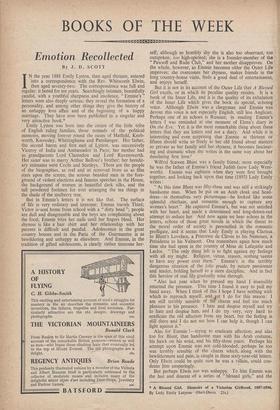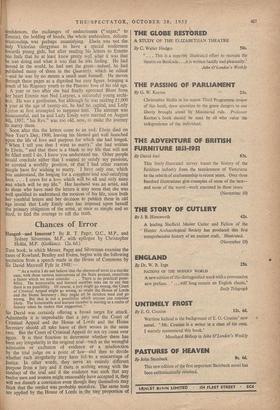BOOKS OF THE WEEK
Emotion Recollected
By J. D. SCOTT IN the year 1888 Emily Lytton, then aged thirteen, entered into a correspondence with the Rev. Whitworth Elwin, then aged seventy-two. The correspondence was full and regular; it lasted for ten years. Searchingly intimate, beautifully candid, with a youthful sharpness and insolence, " Emmie's letters were also deeply serious; they reveal the formation of a personality, and among other things they give the history of an unhappy love affair and of the beginning of a happy marriage. They have now been published in a singular and very attractive book.* Emily Lytton was born into the centre of the little tribe of English ruling families, thosd nomads of the political memoirs, moving forever round the oases of Hatfield, Kneb- worth, Knowsley, Whittinghame and Panshanger. Her father, the second baron and first earl of Lytton, was successively Viceroy of India and Ambassador in Paris; her mother had as grandparents Lord Clarendon and Lord Ravensworth. Her sister was to marry Arthur Balfour's brother; her heredit- ary intimates were Cecils and Stanleys. These are the people of the biographies, as real and as removed from us as film stars upon the screen, the serious bearded men in the fore- ground of violent elections and famous speeches in the House, the background of women in beautiful dark silks, and the tall powdered footmen for ever arranging the tea things in the shade of the mulberry tree.
But in Emmie's letters it is not like that. The surface of life is very ordinary and tiresome; Emmie travels Third; Victor is-sent home from school with a " dirty head "; people are dull and disagreeable and the boys are complaining about the food; Emmie bites her nails until her fingers bleed. Her shyness is, like a hair shirt and her relationship with her parents is difficult and painful. Adolescence in the great country houses and in the Paris of the Guermantes is as bewildering and unhappy as elsewhere. And Emmie, in the tradition of gifted adolescents, is clearly rather tiresome her- self; although so horribly shy she is also too observant, too outspoken, too high-spirited; she is a founder-member of the " Pawsoff and Rude Club," and her mother disapproves. On the whole, however, as Emmie becomes older the Outer Life improves; she overcomes her shyness, makes friends in the long country-house visits, finds a good deal of entertainment, and enjoys herself.
But it is not in its account of the Outer Life that A Blessed Girl excels, or in which its peculiar quality resides. It is a book of the Inner Life, and it is the quality of its exhalation of the Inner Life which gives the book its special, echoing voice. Although Elwin was a clergyman and Emmie was devout this voice is not especially English, still less Anglican. Perhaps one of its echoes is Russian; in reading Emmie's letters I was reminded at one moment of Elena's diary in On the Eve. Yet it is the most remarkable thing about these letters that they are letters and not a diary. And while it is interesting and even surprising that Emmie at thirteen or fifteen should write so freely to her old friend about matters so private as her family and her shyness, it becomes fascinat- ing and dramatic when she writes in the same way about her desolating first love!
Wilfrid Scawen Bltint was a family friend; more especially he was the father of Emmie's friend Judith (now Lady Went- worth). Emmie was eighteen when they were first brought together, and looking back upon that time (1893) Lady Emily writes : " At this time Blunt was fifty-three and was still a strikingly handsome man. When he put on an Arab cloak and head- dress—in themselves very picturesque—he looked like some splendid chieftain, and romantic enough to capture any woman's heart." He captured Emmie's, but was not satisfied with her heart, and made a determined and long-drawn-out attempt to seduce her. And now again we hear echoes in the letters, echoes of those great novels in which the threat to the moral order of society is personified in the romantic profligate, and it seems that Lady Emily is playing Clarissa to Blunt's Lovelace, a Princesse de Cleves to his Nemours, a Prdsidente to his Valmont. One remembers again how much time she had spent in the country of Mme de Lafayette and Laclos. " The only thing left is to fight against my feelings with all my might. Religion, virtue, reason, nothing 'seems to have any power over them." Emmie's is the terribly dangerous situation of the jolie prude, by nature passionate and tender, holding herself to a stern discipline. And in fact this heroine of real life gradually wins through.
" Also last year when he pressed my hand I insensibly returned the pressure. This time I found it easy to pull my hand away. When I think of this I hope I have nothing with which .to reproach myself, anda,yet 3 do for this reason : I am still terribly sensible of hi!' charm and feel too much pleasure in his presence. I hate and despise myself and try to hate and despise him, and I do try very, very hard to eradicate the old affection from my heart, but the feeling is still there and I do not see how I can help it, though I can fight against it."
Alas for Emmie !—trying to eradicate affection; and alas too for Blunt, that handsome man with his Arab costume, his hawk on his wrist, and his fifty-three years. Perhaps his attempt upon Emmie was not cold-blooded; .perhaps he too was terribly sensible of the charm which, along with the bewilderment and pain, is caught in these sixty-year-old letters. Only Elwin could be quite sure he was a villain, could con- demn him unsparingly.
But perhaps Elwin too was unhappy. To him Emmie was the last and dearest of a series of blessed girls," and the
* A Blessed Girl. Memoirs of a Victorian Girlhood, 1887-1896. By Lady Emily Lutyens. (Hart-Davis. 21s.)
confidences, the exchanges of endearments (" sugar," to Emmie), the holding of hands, the whole ambivalent, delicate relationship, was perhaps unsatisfying. Elwin was not the. Only Victorian clergyman to have a special tenderness towards young girls, but after reading his letters to Emmie one feels that he at least knew pretty well what it was that he was doing and what it was that he was feeling. He had moved in the world, he had met the great—indeed, he had published many of them in the Quarterly, which he edited —and he was by no means a small man himself. He moves through these pages as a dignified but easy figure, bringing a touch of his Regency youth to the Platonic love of his old age.
A year or two after she had finally uprooted Blunt from her heart Emmie met Ned Lutyens, a successful young archi- tect. He was a gentleman, but although he was making £1,000 year at the age• of twenty-six, he had no capital, and Lady Lytton at first attempted to suppress him. The attempt was unsuccessful, and he and Lady Emily were married on August 4th, 1897: " his Rev." was too old, now, to make the journey to marry them.
Soon after this the letters come to an end; Elwin died on New Year's Day, 1900, leaving his blessed girl well launched upon the life of love and purpose for which she had longed. " When I tell you that I want to marry," she had written to Elwin, " and that there is a blank in my life that will not be filled until I do, I know you understand me. Other people would conclude either that I wanted to satisfy my passions, or coveted a worldly position, or that I had other reasons people have for wishing to marry. I have only one, which you understand, the longing for a complete and soul-satisfying love. . . . I crave for a love which will be all and only mine and which will be my life." Her husband was an artist, and to those who have read the letters it may seem that she was well qualified to understand the motives of his life, since both her youthful letters and her decision to publish them in old age reveal that Lady Emily also has imposed upon herself the primary obligation of the artist, at once so simple and so hard, to find the courage to tell the truth.



































 Previous page
Previous page